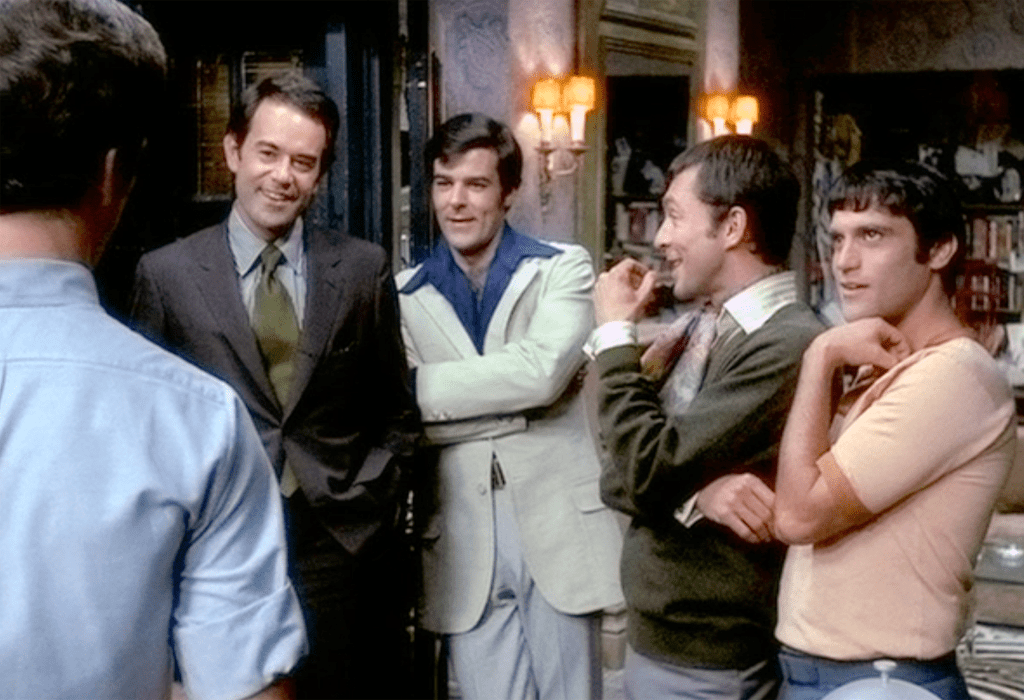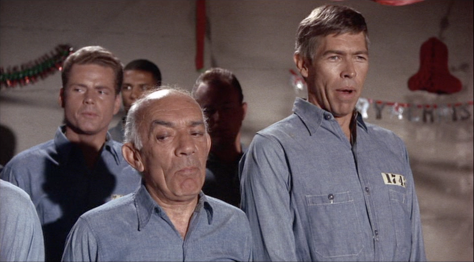By Dennis Hartley
(Originally posted on Digby’s Hullabaloo on March 9, 2024)
I’m sure you are aware that the Academy Awards ceremonies are this Sunday. As an alleged “movie critic”, I sheepishly admit I have only seen 1 of the10 nominees for 2023’s Best Picture: Oppenheimer, if you really must pry (“I must! I must!”). Then again, it’s been years since Academy voters and I have seen eye to eye as to what constitutes a “best picture”. Either my aesthetic has changed, or the Academy has lowered its standards. I don’t think my aesthetic has changed, if you catch my drift.
This is my way of explaining in advance why you may notice only one “Best Picture” winner from the last several decades made my list, which I have culled from the previous 95 Academy Awards. Or perhaps it’s just my long-winded way of saying “they don’t make ‘em like they used to”. And keep the hell off my lawn.

You Can’t Take it With You (Best Picture of 1938) – 86 years on, Frank Capra’s movie version of George S. Kaufman and Moss Hart’s stage play (adapted for the screen by Robert Riskin, who was nominated) still resonates in light of our current economic woes.
A Wall Street fat cat (Edward Arnold) comes up with various nefarious machinations to force a stubborn but happy-go-lucky homeowner (Lionel Barrymore) and his eccentric and free-spirited family to sell him his property, in order to make way for a new factory he wants to build in a prime metropolitan location.
Complications ensue when Barrymore’s granddaughter (Jean Arthur) falls in love with Arnold’s son (James Stewart). Hilarity abounds, fueled by contrasting worldviews of Arnold’s uptight, greedy capitalist and Barrymore’s fun-loving non-conformist. There’s tons of slapstick, and in accordance with the rules of screwball comedy, nearly the entire cast eventually ends up standing before a judge (en masse) with a lot of explaining to do.
Although this is one of Capra’s more lightweight films, he still folds in social commentary about the disparity between the haves vs. the have-nots; in some respects it feels like a warm-up for It’s a Wonderful Life. Capra also picked up a Best Director win.

Casablanca (Best Picture of 1943)-Romance, exotic intrigue, Bogie, Ingrid Bergman, evil Nazis, selfless acts of quiet heroism, Paul Henreid, Peter Lorre, Sidney Greenstreet, Rick’s Café, Claude Rains rounding up the usual suspects, Dooley singing “As Time Goes By”, the beginning of a beautiful friendship, the most rousing rendition of “La Marseille” you’ve ever heard, that goodbye scene at the airfield, and a timeless message (if you love someone, set them free). What’s not to love about this movie-lover’s movie? Michael Curtiz directed; Julius J. Epstein, Philip G. Epstein, and Howard Koch adapted the screenplay from a play by Murray Burnett and Joan Alison.
From Here to Eternity (Best Picture of 1953) – Even though James Jones’ steamy source novel about restless G.I.s stationed at Pearl Harbor was sanitized for the screen, Fred Zinnemann’s film was still relatively risqué and heady adult fare for its time.
Montgomery Clift was born to play angst-ridden company bugler (and sometime pugilist) Pvt. Robert E. Lee Prewitt, a “hard case” at constant loggerheads with his superiors (and his personal demons).
And what a cast-outstanding performances abound from Burt Lancaster, Deborah Kerr, Frank Sinatra (he won Best Actor in a Supporting Role), Jack Warden, Ernest Borgnine, and Donna Reed. At that point of Reed’s career, it was considered casting against type to have her portray a sex worker, but it paid off with a Best Actress in a Supporting Role win.
Zinnemann won Best Director, screenwriter Daniel Taradash picked up a Best Writing (Screenplay) for his adaptation, Burnett Guffey won for Cinematography (Black and White), and William A. Lyon took home a statue for Best Film Editing.

West Side Story (Best Picture of 1961)- Jerome Robbins and Robert Wise co-directed this classic musical drama (with a screenplay adapted by Ernest Lehman from the stage version). You know, there are so many Deep Thoughts that I have gleaned as a result of myriad viewings of this fine film over the years; and since I am holding the Talking Stick, I wish to share a few of them with you now:
- When you’re a Jet, you stay a Jet.
- Something’s coming; don’t know when…but it’s soon.
- I like the island Manhattan.
- Breeze it, buzz it, easy does it.
- It’s alarming, how charming I feel.
- Deep down inside us, there is good.
You’re welcome.

Lawrence of Arabia (Best Picture of 1962) – Until you have viewed David Lean’s masterpiece on a theater screen, you can’t really comprehend how big the desert is. Really big. You just won’t believe how vastly hugely mind-bogglingly big it is. Or how commanding and charismatic 29 year-old Peter O’Toole was in his first starring role.
O’Toole delivers a larger-than-life performance as T.E. Lawrence, a flamboyant and outspoken British army officer who reinvented himself as a guerilla leader, gathering up warring Arab tribes and uniting them in a common cause to oust the Turks during WW I.
Robert Bolt and Michael Wilson based their literate screenplay on Lawrence’s memoirs, sustaining a sense of intimacy throughout. This was no small feat, considering the film’s overall epic sweep and visual splendor (DP Freddie Young and editor Anne V. Coates more than earned their Oscars).
Omar Sharif, Anthony Quinn, Alec Guinness, Jack Hawkins, Claude Rains and Jose Ferrer round off a fine cast, and you can’t discuss this film without acknowledging Maurice Jarre’s magnificent “Best Score”.

In the Heat of the Night (Best Picture of 1967) – “They call me Mister Tibbs!” Sidney Poitier plays a cosmopolitan police detective from Philly who gets waylaid in a torpid Mississippi backwater, where he is reluctantly recruited into helping the bigoted sheriff (Rod Steiger) solve a local murder.
Poitier really nails his performance; you can feel Virgil Tibb’s pain as he tries to maintain his professional cool amidst a brace of surly rednecks, who throw up roadblocks at every turn.
While Steiger is outstanding as well, I find it ironic that he was the one who won “Best Actor in a leading role”, when Poitier was the star of the film (it seems Hollywood didn’t get the film’s message).
Sterling Silliphant’s brilliant screenplay (another Oscar) works as a crime thriller and a “fish out of water” story. Director Norman Jewison was nominated but didn’t score a win. Future director Hal Ashby won for Best Editing. Quincy Jones composed the soundtrack, and Ray Charles sings the sultry theme.

Midnight Cowboy (Best Picture of 1969) – “I’m WALKIN’ heah!” Aside from its distinction as being the only X-rated film to earn Oscars, John Schlesinger’s groundbreaking, idiosyncratic character study Midnight Cowboy (1969) also ushered in an era of mature, gritty realism in American film that flourished from the early to mid-1970s. The film was Schlesinger’s first U.S.-based project; he had already made a name for himself in his native England with films like A Kind of Loving, Billy Liar, Darling, and Far From the Madding Crowd.
Dustin Hoffman has seldom matched his character work here as Ratso Rizzo, a homeless New York City con artist who adopts country bumpkin/aspiring male hustler Joe Buck (Jon Voight) as his “protégé”. The two leads are outstanding, as is the supporting cast, which includes John McGiver, Brenda Vaccaro, Barnard Hughes and a teenage Bob Balaban. Also look for cameos from several of Warhol’s “Factory” regulars in a memorable party scene.
In hindsight, the location filming provides a fascinating historical document of the seedy milieu that was “classic” Times Square (New York “plays itself” very well here). Schlesinger won an Oscar for Best Director, as did Waldo Salt for his screenplay.

The Godfather (Best Picture of 1972) and The Godfather, Part II (Best Picture of 1974)-Yes, I’m counting them as one; because in a narrative and artistic sense, they are. Got a problem with that? Tell it to Luca Brasi. Taken as a whole, Francis Ford Coppola’s two-part masterpiece (with screenplays co-written by the director with Mario Puzo) is best summed up thusly: Brando, Pacino, and De Niro.

Annie Hall (Best Picture of 1977) – As far as his “earlier, funny films” go, this semi-autobiographical entry ranks as one of Woody Allen’s finest, and represents the moment he found his voice as a filmmaker.
The Academy concurred, awarding three additional Oscars as well-for Best Actress (leading lady Diane Keaton, in her career-defining role), for Director (Allen) and for Best Original Screenplay (Allen again, along with co-writer Marshall Brickman).
Part 1 of a triptych (or so the theory goes) that continued with Manhattan and Hannah and Her Sisters, it is also the film that neatly divides the history of the romantic comedy in half. So many of the narrative framing techniques and comic inventions that Allen utilized have become so de rigueur for the genre that it’s easy to forget how wonderfully innovative and fresh this film was back in 1977. A funny, bittersweet, and perceptive look at modern romance.

No Country for Old Men (Best Picture of 2007) – The bodies pile up faster than you can say Blood Simple in Joel and Ethan Coen’s masterfully constructed neo-noir (which earned them a shared Best Director trophy). The brothers’ Oscar-winning screenplay (adapted from the Cormac McCarthy novel) is rich in characterization and thankfully devoid of the self-conscious quirkiness that has left some of their latter-day films teetering on self-parody.
The story is set among the sagebrush and desert heat of the Tex-Mex border, where the deer and the antelope play. One day, good ol’ boy Llewelyn (Josh Brolin) is shootin’ at some food (the playful antelope) when he encounters a grievously wounded pit bull. The blood trail leads to discovery of the aftermath of a shootout. As this is Coen country…that twisty trail does lead to a twisty tale.
Tommy Lee Jones gives a wonderful low-key performance as an old-school, Gary Cooper-ish lawman who (you guessed it) comes from a long line of lawmen. Jones’ face is a craggy, world-weary road map of someone who has reluctantly borne witness to every inhumanity man is capable of, and is counting down the days to imminent retirement (‘cos it’s becoming no country for old men…).
The cast is outstanding. Javier Bardem picked up a Best Supporting Actor statue for his turn as a psychotic hit man. His performance is understated, yet menacing, made all the more unsettling by his Peter Tork haircut. Kelly McDonald and Woody Harrelson are standouts as well. Curiously, Roger Deakins wasn’t nominated for his cinematography, but his work on this film ranks among his best.













































